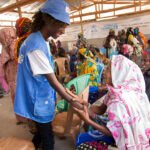Only eight countries in Africa have blood services that are designed to always ensure the highest levels of quality and safety for patients and donors, the World Health Organisation (WHO) has said.
Development Diaries reports that WHO made this known against the backdrop of World Blood Donor Day, which is observed every 14 June.
Activities for the day include raising awareness of safe blood and blood products, such as plasma, and highlighting the critical contribution of voluntary, unpaid blood donors to save lives.
The 2023 World Blood Donor Day has the slogan: ‘Give blood, give plasma, share life, share often’.
The WHO Regional Director for Africa, Dr Matshidiso Moeti, in a statement, noted that blood collection remains low at an average donation rate of 5.9 units per 1,000 people compared to 33.1 donations per 1,000 people in high-income countries.
‘Of concern is the financial barrier to accessing safe blood. In the WHO Africa region, patients pay, on average, U.S.$ 42 out of pocket to access safe blood’, he said.
‘Over the years, member states in the WHO African region have made significant progress in establishing nationally coordinated blood transfusion services, policy frameworks, and national standards for collecting, testing, processing, storing and distributing blood and blood products.
‘This notable progress, notwithstanding, only eight countries have blood services that are designed to always ensure the highest levels of quality and safety for patients and donors. Reliance on non-renumerated blood donors is still high, with 16 countries accounting for over 80 percent of voluntary non-remunerated blood donation’.
Moeti stressed the need to address persistent challenges to ensure sustainable access to safe and quality-assured blood and blood products for needy patients.
He also called for sustainable funding to ensure safe and quality-assured blood and blood product for needy patients.
‘Through our collaborative efforts, we must raise adequate and sustainable funding and increase blood donation rates’, he added.
‘We also need to build the capacity of countries to separate donated blood into its components such as red cell concentrates, platelet concentrates, fresh frozen plasma, and cryoprecipitate, and curb inappropriate clinical transfusion practices’.
He called on governments, partners and stakeholders to mobilise support to invest in strengthening and sustaining blood programs in Africa.
Photo source: WHO






